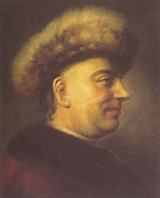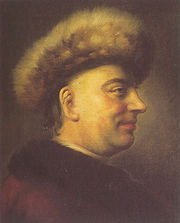
Barthold Heinrich Brockes
Encyclopedia
Barthold Heinrich Brockes (September 22, 1680 – January 16, 1747) was a German
poet
.
 He was born at Hamburg
He was born at Hamburg
and educated at the Gelehrtenschule des Johanneums
. He studied jurisprudence
at Halle, and after extensive travels in Italy
, France and the Netherlands
, settled in Hamburg in 1704. In 1720 he was appointed a member of the Hamburg senate, and entrusted with several important offices. Six years (from 1735 to 1741) he spent as Amtmann (magistrate) at Ritzebüttel. He died in Hamburg.
Brockes' poetic works were published in a series of nine volumes under the fantastic title Irdisches Vergnügen in Gott (1721–1748); he also translated Giambattista Marini's La Strage degli innocenti (1715), Alexander Pope
's Essay on Man (1740) and James Thomson's Seasons (1745). His poetry has small intrinsic value, but it is symptomatic of the change which came over German literature at the beginning of the 18th century. His libretto
Der für die Sünden der Welt gemarterte und sterbende Jesus (1712) was one of the first passion oratorios--a free, poetic meditation on the passion
story without the use of an evangelist
character. It was quite popular and was set to music by Reinhard Keiser
(1712), Georg Philipp Telemann
(1716), George Frideric Handel
(1716), Johann Mattheson
(1718), Gottfried Heinrich Stölzel
(1725) and Johann Friedrich Fasch
(1723), among others.
He was one of the first German poets to substitute for the bombastic imitations of Marini, to which he himself had begun by contributing, a clear and simple diction. He was also a pioneer in directing the attention of his countrymen to the new poetry of nature which originated in England. His verses, artificial and crude as they often are, express a reverential attitude towards nature and a religious interpretation of natural phenomena which was new to German poetry and prepared the way for Klopstock.
Germany
Germany , officially the Federal Republic of Germany , is a federal parliamentary republic in Europe. The country consists of 16 states while the capital and largest city is Berlin. Germany covers an area of 357,021 km2 and has a largely temperate seasonal climate...
poet
Poet
A poet is a person who writes poetry. A poet's work can be literal, meaning that his work is derived from a specific event, or metaphorical, meaning that his work can take on many meanings and forms. Poets have existed since antiquity, in nearly all languages, and have produced works that vary...
.

Hamburg
-History:The first historic name for the city was, according to Claudius Ptolemy's reports, Treva.But the city takes its modern name, Hamburg, from the first permanent building on the site, a castle whose construction was ordered by the Emperor Charlemagne in AD 808...
and educated at the Gelehrtenschule des Johanneums
Gelehrtenschule des Johanneums
The Gelehrtenschule des Johanneums is a Gymnasium in Hamburg, Germany. It is Hamburg's oldest school and was founded in 1529 by Johannes Bugenhagen. The school's motto is The Future needs a Heritage...
. He studied jurisprudence
Jurisprudence
Jurisprudence is the theory and philosophy of law. Scholars of jurisprudence, or legal theorists , hope to obtain a deeper understanding of the nature of law, of legal reasoning, legal systems and of legal institutions...
at Halle, and after extensive travels in Italy
Italy
Italy , officially the Italian Republic languages]] under the European Charter for Regional or Minority Languages. In each of these, Italy's official name is as follows:;;;;;;;;), is a unitary parliamentary republic in South-Central Europe. To the north it borders France, Switzerland, Austria and...
, France and the Netherlands
Netherlands
The Netherlands is a constituent country of the Kingdom of the Netherlands, located mainly in North-West Europe and with several islands in the Caribbean. Mainland Netherlands borders the North Sea to the north and west, Belgium to the south, and Germany to the east, and shares maritime borders...
, settled in Hamburg in 1704. In 1720 he was appointed a member of the Hamburg senate, and entrusted with several important offices. Six years (from 1735 to 1741) he spent as Amtmann (magistrate) at Ritzebüttel. He died in Hamburg.
Brockes' poetic works were published in a series of nine volumes under the fantastic title Irdisches Vergnügen in Gott (1721–1748); he also translated Giambattista Marini's La Strage degli innocenti (1715), Alexander Pope
Alexander Pope
Alexander Pope was an 18th-century English poet, best known for his satirical verse and for his translation of Homer. He is the third-most frequently quoted writer in The Oxford Dictionary of Quotations, after Shakespeare and Tennyson...
's Essay on Man (1740) and James Thomson's Seasons (1745). His poetry has small intrinsic value, but it is symptomatic of the change which came over German literature at the beginning of the 18th century. His libretto
Libretto
A libretto is the text used in an extended musical work such as an opera, operetta, masque, oratorio, cantata, or musical. The term "libretto" is also sometimes used to refer to the text of major liturgical works, such as mass, requiem, and sacred cantata, or even the story line of a...
Der für die Sünden der Welt gemarterte und sterbende Jesus (1712) was one of the first passion oratorios--a free, poetic meditation on the passion
Passion (Christianity)
The Passion is the Christian theological term used for the events and suffering – physical, spiritual, and mental – of Jesus in the hours before and including his trial and execution by crucifixion...
story without the use of an evangelist
Four Evangelists
In Christian tradition the Four Evangelists are Matthew, Mark, Luke, and John, the authors attributed with the creation of the four Gospel accounts in the New Testament that bear the following titles:*Gospel according to Matthew*Gospel according to Mark...
character. It was quite popular and was set to music by Reinhard Keiser
Reinhard Keiser
Reinhard Keiser was a popular German opera composer based in Hamburg. He wrote over a hundred operas, and in 1745 Johann Adolph Scheibe considered him an equal to Johann Kuhnau, George Frideric Handel and Georg Philipp Telemann , but his work was largely forgotten for many...
(1712), Georg Philipp Telemann
Georg Philipp Telemann
Georg Philipp Telemann was a German Baroque composer and multi-instrumentalist. Almost completely self-taught in music, he became a composer against his family's wishes. After studying in Magdeburg, Zellerfeld, and Hildesheim, Telemann entered the University of Leipzig to study law, but eventually...
(1716), George Frideric Handel
George Frideric Handel
George Frideric Handel was a German-British Baroque composer, famous for his operas, oratorios, anthems and organ concertos. Handel was born in 1685, in a family indifferent to music...
(1716), Johann Mattheson
Johann Mattheson
Johann Mattheson was a German composer, writer, lexicographer, diplomat and music theorist.Mattheson was born and died in Hamburg. He was a close friend of George Frideric Handel, although he nearly killed him in a sudden quarrel, during a performance of Mattheson's opera Cleopatra in 1704...
(1718), Gottfried Heinrich Stölzel
Gottfried Heinrich Stölzel
Gottfried Heinrich Stölzel was a prolific German composer.-Biography:Stölzel grew up in Schwarzenberg, Saxony in the Erzgebirge. From 1707 he was a student of theology in Leipzig, and of Melchior Hofmann, the musical director of the Neukirche. He studied, worked and composed in Breslau and Halle...
(1725) and Johann Friedrich Fasch
Johann Friedrich Fasch
Johann Friedrich Fasch was a German violinist and composer.Fasch was born in Buttelstedt, was a choirboy in Weissenfels and studied under Johann Kuhnau at the famous St. Thomas School in Leipzig and later founded a Collegium Musicum in that city...
(1723), among others.
He was one of the first German poets to substitute for the bombastic imitations of Marini, to which he himself had begun by contributing, a clear and simple diction. He was also a pioneer in directing the attention of his countrymen to the new poetry of nature which originated in England. His verses, artificial and crude as they often are, express a reverential attitude towards nature and a religious interpretation of natural phenomena which was new to German poetry and prepared the way for Klopstock.
External links
- http://www.brockes-kimber-grove.co.uk/ Ida Kimber

